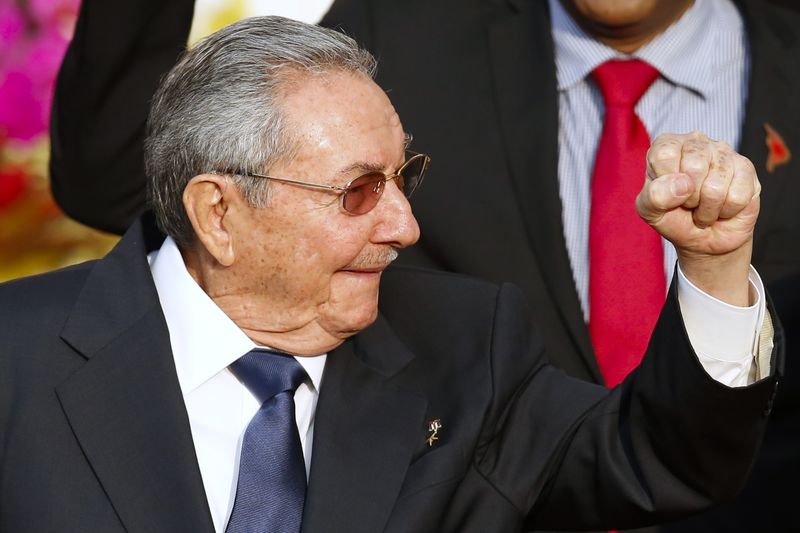By Matt Spetalnick and Mark Hosenball
WASHINGTON (Reuters) - The U.S. State Department is closing in on a decision to recommend removal of Cuba from its list of countries accused of sponsoring terrorism, days before President Barack Obama attends a regional summit with his Cuban counterpart Raul Castro.
Obama ordered the review after announcing a diplomatic breakthrough with Havana on Dec. 17 and has vowed to act quickly once he receives the recommendation, which would mark a significant move toward ending more than five decades of estrangement.
Obama leaves on Wednesday for a trip to Jamaica and then to Panama, where he will participate in the April 10-11 Summit of the Americas and come face-to-face with Castro.
A U.S. official told Reuters the State Department could send its conclusions to Obama this week, calling for the Communist-ruled island to be taken off the blacklist.
Cuba's presence on the state-sponsored terror list has been a major stumbling block in efforts to restore relations and re-establish embassies. Havana has flatly demanded its removal before diplomatic ties can be restored.
Cuba was added to the list of terrorism sponsors - a distinction it has shared with Iran, Sudan and Syria - in 1982, when it was aiding Marxist insurgencies in Colombia and elsewhere.
Two U.S. officials close to the matter said an inter-agency team carrying out the review was under pressure from high levels of the administration to wrap up their investigation. But the officials said the exact timing was still being worked out and further delays were possible.
White House spokesman Josh Earnest told reporters that the State Department process would likely "move to the next stage relatively soon" but said he "wouldn't necessarily expect a final decision in the next day or two," suggesting that Obama would still need some time to consider the matter.
'FINAL STAGES'
In a sign of the slow-moving diplomacy, White House deputy national security adviser Ben Rhodes said the United States does not expect to seal an agreement for the reopening of embassies in time for the summit.
Still, he said the effort to remove Cuba from the terrorism sponsor list was "likely in the final stages."
Obama's aides hope his historic opening to Cuba will generate goodwill among the Latin American and Caribbean leaders who have long argued against U.S. isolation of Havana as counterproductive. He privately bristled over harangues he faced over the Cuba embargo at the last summit in Cartagena in 2012.
Not all will be harmonious at the upcoming gathering.
Angered by U.S. sanctions slapped on select members of his government last month and backed by leftist regional allies, Venezuelan President Nicolas Maduro has said he plans to hand Obama a petition of protest signed by millions of Venezuelans.
"The improvement in ties between the U.S. and Cuba certainly gives the Americans a lot of political capital for this summit," a senior Brazilian diplomat said. But he added that "sanctions against Venezuela will not make things easier for them."
Still, most believe the issue of Venezuela, a close ally and financial benefactor of Cuba, will not overshadow the gathering. "I don't think they can upset the summit," said Michael Shifter, president of the Inter-American Dialogue think tank.
Obama and Castro will "interact" and possibly have "conversations" on the margins of the summit, although no formal talks have yet been scheduled, Rhodes said. Many expect a choreographed handshake to symbolically seal their countries' reconciliation.
FUGITIVES CITED
Secretary of State John Kerry may meet with Cuban Foreign Minister Bruno Rodriguez at the summit, the State Department said.
But even as Obama and his aides push for further normalization, Obama could also irk Cuban delegates when he meets civil society activists, including Cuban dissidents, on Friday.
Obama's implicit message to Latin American leaders is now that he has met their demands to allow Cuba into the fold, they in return should speak out more about Cuban and Venezuelan human rights problems, an Obama aide said, speaking on condition of anonymity.
Though Cuba's efforts to support leftist insurgencies have ended, and it is now helping a peace effort in Colombia, some Republican lawmakers insist Cuba should remain on the list as long as it continues to harbour fugitives wanted in the United States.
They include Joanne Chesimard, wanted in the slaying of a New Jersey state trooper in the early 1970s.
Still, a U.S. official said Washington and Havana were close to resolving a U.S. demand for written Cuban assurances of no future support for terrorism. Cuba made a reciprocal demand to the United States.
Removing Cuba from the list would ease some financial sanctions against the island. But the broader U.S. embargo on Cuba, which can only be lifted by Congress, would remain.

"As soon as I get a recommendation, I'll be in a position to act on it," Obama said in an interview with National Public Radio. His approval would not take effect until after a 45-day congressional review but lawmakers are not expected to block it.